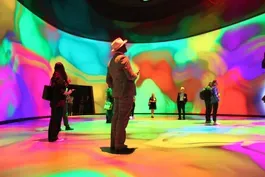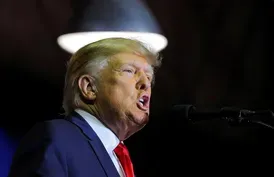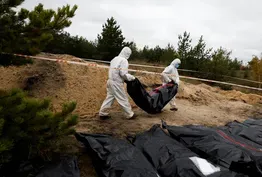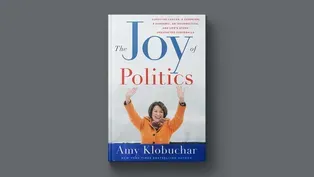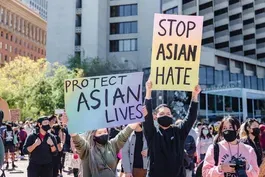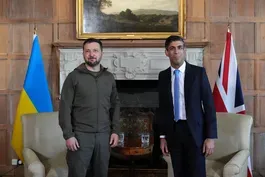
A look at battles over abortion rights at the state level
Clip: 5/15/2023 | 11m 11sVideo has Closed Captions
A look at primary elections and battles over abortion rights at the state level
There are political battles on the state level this week with a handful of primary races heating up and action on abortion laws. We check in with reporters Colin Campbell of North Carolina, Ryland Barton of Kentucky and Katie Meyer of Pennsylvania to help bring us up to speed.
Problems with Closed Captions? Closed Captioning Feedback
Problems with Closed Captions? Closed Captioning Feedback
Major corporate funding for the PBS News Hour is provided by BDO, BNSF, Consumer Cellular, American Cruise Lines, and Raymond James. Funding for the PBS NewsHour Weekend is provided by...

A look at battles over abortion rights at the state level
Clip: 5/15/2023 | 11m 11sVideo has Closed Captions
There are political battles on the state level this week with a handful of primary races heating up and action on abortion laws. We check in with reporters Colin Campbell of North Carolina, Ryland Barton of Kentucky and Katie Meyer of Pennsylvania to help bring us up to speed.
Problems with Closed Captions? Closed Captioning Feedback
How to Watch PBS News Hour
PBS News Hour is available to stream on pbs.org and the free PBS App, available on iPhone, Apple TV, Android TV, Android smartphones, Amazon Fire TV, Amazon Fire Tablet, Roku, Samsung Smart TV, and Vizio.
Providing Support for PBS.org
Learn Moreabout PBS online sponsorshipWILLIAM BRANGHAM: There is a lot happening at the state level this week, with a handful of primary races heating up and action on abortion laws happening across the country.
Kentucky and Pennsylvania both have key primary races under way, one for a governor's race and another for the state Supreme Court.
Meanwhile, in North Carolina, a Democratic governor squares off with a Republican legislature over a 12-week abortion ban.
To unpack the specifics in each state, we're going to check in with a few state reporters.
We will start in North Carolina, where WUNC's Capitol bureau chief, Colin Campbell, has been reporting on this back-and-forth on this controversial abortion measure.
Colin, thank you so much for being here.
So tell us about this bill that Governor Roy Cooper vetoed this weekend.
What did that bill do?
COLIN CAMPBELL, Capitol Bureau Chief, WUNC: So, the top line of it, of course, is that it's a ban on most abortions after 12 weeks.
There's still exceptions after that point for things like rape, the life of the mother and fetal abnormalities.
And some of those exceptions expire a little bit further into the pregnancy time frame.
There's also some new notification requirements and new requirements for in-person doctor's visits that critics are saying that it's going to make it harder for women who are actually seeking abortion in the first trimester to be able to actually go through the process, particularly if they're in rural areas or it's hard for them to get to the doctor for one reason or another.
So that's sort of the bulk of it.
They have also paired in some unrelated things like paid parental leave and funding for foster families into this larger bill that's going through the legislature here in North Carolina.
WILLIAM BRANGHAM: So, Governor Cooper made his veto this weekend in a very public way at a rally this weekend.
It seems like there's some clear messaging implied with that.
COLIN CAMPBELL: Absolutely.
I mean, this is a situation where there's not a whole lot of likelihood that the governor can convince Republicans to break with their party and sustain his veto here.
But, certainly, thousands showed at this rally.
It had a very political undertone, looking ahead to next year's election.
Certainly, Democrats in North Carolina feel like this is an issue that can fire up their base and potentially help them flip some seats in the legislature to their party and keep the governor's mansion in Democratic hands coming up to 2024.
WILLIAM BRANGHAM: So does the GOP supermajority in the legislature have the votes to override this veto?
COLIN CAMPBELL: Yes, they have just a very narrow majority, thanks in part to a particular Democrat who switched parties, became a Republican and ultimately voted for this bill the first time around.
So, as long as everybody sticks with how they voted the first time this bill was passed by the legislature, that should be overridden.
Votes are scheduled to take place in both the House and Senate tomorrow, Tuesday.
So we could see this bill becoming law within the next couple of days here in North Carolina and then taking effect with new restrictions in July.
WILLIAM BRANGHAM: So what does that mean, right?
My understanding is that North Carolina -- let's just say this law goes into effect.
I know that North Carolina has been having a lot of women from neighboring states that do have stricter abortion bans in place coming to North Carolina.
This would seem to put North Carolina off the map for that as well.
COLIN CAMPBELL: And I think that's something that Republicans are actually thinking of as they created this particular law.
Certainly, if you're coming from another state, and you have to make multiple doctor's visits, even if you are seeking an abortion prior to 12 weeks, that makes it harder for someone who's coming across from Tennessee to come into North Carolina multiple times to jump through the hoops to get the procedure.
So that may make North Carolina less attractive as a destination for people coming from other Southern states that have stricter bans, even as it's still less strict here than in other states around us and further south that have more six-week or other types of abortion bans on the books.
So we may still see some of that.
It may not be as great.
And some folks may have to drive further north to be able to get a quick and easy-to-access abortion procedure.
WILLIAM BRANGHAM: All right, Colin Campbell of WUNC, thank you so much for being here.
COLIN CAMPBELL: Thanks for having me.
WILLIAM BRANGHAM: Turning now to Kentucky, Republican voters will head there to the polls tomorrow in one of the nation's most contested races of the year.
Kentucky is just one of three states with gubernatorial elections this cycle, along with Louisiana and Mississippi.
But with Democrat Andy Beshear currently in the governor's mansion, the GOP is looking to secure all levers of the government in that state.
Ryland Barton from Kentucky Public Radio joins us now.
Ryland, thank you so much for being here.
A bunch of Republicans want to get in and get this nomination to go after Governor Beshear.
What are the main issues that voters are talking about now?
RYLAND BARTON, Kentucky Public Radio: I mean, one of the big issues is the fact that Andy Beshear, a Democrat, is governor in such a Republican state as Kentucky has become in recent years.
Republicans really feel like this is their chance to topple him during the general election in November.
And so there's a long line.
About 12 Republicans have lined up to -- for the chance at the nomination, three main contenders so far.
A lot of the arguments during the race have focused on some of the hot-button national issues that you have seen across the country and in Congress even, a lot of anti-trans messaging and leaning into anti-trans policies that were passed during the -- Kentucky's legislative session earlier this year, and really accusing one another of being the most liberal or so-called woke candidate within the Republican primary.
So, it's gotten -- it's gotten a little nasty towards the end of the race here, a lot of mudslinging going on, and a couple of candidates trying to capitalize on not getting into the -- into that fight too.
WILLIAM BRANGHAM: And who are those top candidates.
RYLAND BARTON: So there's Daniel Cameron.
He's the Republican attorney general.
He's been in office for four years, and then also -- and he's the one who's endorsed by former President Donald Trump.
And then there's Kelly Craft, former ambassador to the United Nations during the Trump administration.
She was a prolific fund-raiser in Republican politics in Kentucky.
And I think it's a notable that, towards the end of this race, they have been accusing each other of being the most -- who's the less establishment candidate?
Kelly Craft going after Daniel Cameron for being a protege of Senate Minority Leader Mitch McConnell.
And so, again, they're kind of -- there's -- during the primary, there's this different kind of language going on as to who can be the most conservative, will have to pivot a little bit for the general election.
But, right now, it's gotten very interesting.
And a lot of money's already been spent in it.
WILLIAM BRANGHAM: Now, this is an off-year election.
So there's not a lot of other big races and big names on the ticket to draw voters.
Do you think that that's going to have a big impact on turnout?
RYLAND BARTON: It really will.
And there's the long history of this, because it's always happens in these odd-numbered years.
So, the secretary of state's predicting about 10 percent voter turnout.
Back in 2015, last time, there was a crowded Republican primary, it was about 13 percent.
And the winner in that race, Matt Bevin, ultimately won that race by about 83 votes.
And that was really attributed to the top two candidates getting into a big fight where voters kind of soured on them.
And it created the lane for that third-place candidate to win.
So a lot of people are watching the results with some trepidation because it really could kind of go any way because of the low voter turnout expected.
WILLIAM BRANGHAM: All right, Ryland Barton of Kentucky Public Radio, thank you so much.
RYLAND BARTON: Thank you.
WILLIAM BRANGHAM: Moving over to Pennsylvania now, which holds primary elections tomorrow, voters from both parties will choose their nominees to run to fill a seat on the state Supreme Court.
The seven-member court currently consists of four Democrats and two Republicans with one vacant seat.
One candidate vying for the Republican nomination is Judge Patricia McCullough, who gained notoriety for approving former President Trump's attempts to halt the certification of Pennsylvania's election results back in 2020.
Following this all closely is Katie Meyer.
She's the government editor and reporter with the investigative newsroom Spotlight PA. Katie, thank you so much for being here.
So, Democrats and Republicans are picking their candidate to run for this seat.
What is the state of the race there right now?
KATIE MEYER, Spotlight Pennsylvania: Well, there isn't a lot of polling in these races.
And so, really, the best sense that we can get is from spending, from the fund-raising these candidates have been able to do.
And in the Republican side of this race, it's been pretty lopsided.
Carolyn Carluccio, who's sort of establishment pick for the seat, has far outraised Patricia McCullough.
Carluccio has gotten money from, again, Republican, top donors, the establishment, politicians who are already in power, as well as from major school choice donors.
McCullough, the biggest part of her fund-raising has really come from Doug Mastriano, who was the former Pennsylvania candidate for governor who lost last year.
And he was a pretty far right candidate.
And he was very entrenched in this sort of Stop the Steal election results-denying movement in 2020.
And so they're closely linked, those two.
WILLIAM BRANGHAM: So, Judge McCullough, as you mentioned, is part of that Stop the Steal movement.
We saw certainly that former President Donald Trump has continued, despite all evidence to the contrary, claimed that the 2020 election was stolen from him.
Is there a sense that GOP voters in Pennsylvania are still motivated by that story?
KATIE MEYER: Well, we did see some evidence that that's not a huge motivating factor for Republicans in last year's election.
Doug Mastriano, the candidate who had won the GOP nominee -- again, he won the primary, so that does tell you something, but he badly lost the general election to Josh Shapiro, the Democrat who is governor now.
So I think that gives you a sense, again, of how general election voters in Pennsylvania feel about that.
And, certainly, Republican leaders in the state have taken lessons from that.
They have really put a lot of effort into boosting Carluccio, who they think has a better shot of winning the general election in Pennsylvania.
And so McCullough hasn't gotten a lot of traction among her own party's establishment.
Now, that doesn't mean primary voters won't go for it.
But, again, she hasn't raised or spent much.
WILLIAM BRANGHAM: So, how much of this does really matter?
I mean, we know that that, for instance, there was incredible focus on the state Supreme Court race in Wisconsin.
But, in this case, the Democrats already have a majority, even if a Republican were to win, even if McCullough were to win.
How relevant is that for the court?
KATIE MEYER: Well, it is relevant just because, in a couple years, there will be more seats up on this court, and then Republicans would be in striking distance, especially if they win this year's election, to taking the court back.
And, in Pennsylvania, the courts are pretty partisan.
And, specifically, they often have a huge role to play in choosing congressional maps when we redistrict, in resolving vagaries in election law, because Pennsylvania's election law does have a lot of gray areas, so deciding which ballots can be counted, if these issues aren't resolved.
The courts will have a big role in that.
So I would say these justices will say that they're not very partisan.
And, indeed, they're not supposed to be, but people do view these races as partisan.
So I think that tells you something.
So, yes, absolutely, these elections, especially a few years down the line, will have great effect.
WILLIAM BRANGHAM: All right, Katie Meyer of Spotlight PA, thank you so much for being here.
KATIE MEYER: Thanks for having me.
American Museum of Natural History opens stunning new wing
Video has Closed Captions
Clip: 5/15/2023 | 7m 21s | American Museum of Natural History opens stunning new expansion (7m 21s)
Durham report criticizes FBI for Trump-Russia investigation
Video has Closed Captions
Clip: 5/15/2023 | 4m 50s | Durham report criticizes FBI investigation into Trump campaign's possible ties to Russia (4m 50s)
The roadblocks to holding Putin accountable for war crimes
Video has Closed Captions
Clip: 5/15/2023 | 7m 57s | The roadblocks to holding Putin and his high command accountable for war crimes in Ukraine (7m 57s)
Sen. Klobuchar invites readers into her personal life
Video has Closed Captions
Clip: 5/15/2023 | 7m 17s | Sen. Klobuchar's 'The Joy of Politics' invites readers into her personal life (7m 17s)
Survey of Asian Americans paints sobering picture of fears
Video has Closed Captions
Clip: 5/15/2023 | 5m 54s | Survey of Asian Americans paints sobering picture of fears about violence (5m 54s)
Zelenskyy tours Europe to secure aid in fight against Russia
Video has Closed Captions
Clip: 5/15/2023 | 3m 26s | Zelenskyy tours Europe to secure more military aid in Ukraine's fight against Russia (3m 26s)
Providing Support for PBS.org
Learn Moreabout PBS online sponsorshipSupport for PBS provided by:
Major corporate funding for the PBS News Hour is provided by BDO, BNSF, Consumer Cellular, American Cruise Lines, and Raymond James. Funding for the PBS NewsHour Weekend is provided by...
